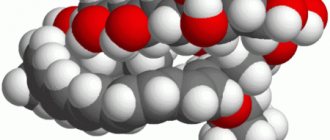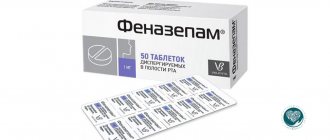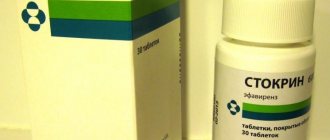Action of amitriptyline
The main effect of amitriptyline is antidepressant.
It also has a sedative (calming), hypnotic and anti-anxiety effect. It has no effect on a healthy person with a normal psychological state. These effects appear only in the presence of depression, restlessness, anxiety and insomnia, respectively. In addition to the effects of amitriptyline, there are other effects:
- Anesthetic.
- Vegetative stabilizing.
- Antidiarrheal (fixing).
- Removes psychosomatic symptoms: skin rash, high blood pressure, restores appetite, etc.
- Effective for some forms of enuresis (bedwetting).
Contraindications
The drug is not approved for use in the presence of the following diseases and characteristics:
- myocardial infarction;
- individual characteristics (intolerance to the active substance);
- angle-closure glaucoma;
- poisoning with certain drugs (sleeping pills, analgesics);
- taking psychoactive substances;
- severe alcohol poisoning;
- breastfeeding (any period);
- disorder of bone marrow hematopoiesis.
In some cases, Amitriptyline can be taken, but only with caution:
- bronchial asthma;
- digestive system disorders;
- stroke;
- dysfunction of the liver, kidneys;
- increased pressure inside the eye;
- pregnancy (any stages);
- epilepsy;
- urinary retention.
Indications for use
As doctors and scientists accumulate experience in the use of amitriptyline and clarify the mechanisms of development of many diseases, the indications for its use are constantly expanding. Main indications:
- Endogenous depression.
- Depressive psychosis.
- Anxiety disorders: generalized anxiety disorder, panic disorder, phobias, obsessive-compulsive disorder.
- Organic anxiety and depression.
- Schizotypal disorder, schizophrenia with depressive symptoms.
- Addictions (alcohol, drug, polydrug addiction).
- Neuroses.
- Personality disorders (psychopathy).
- Somatoform and psychosomatic diseases.
- Eating disorders.
- Pain syndrome.
- Enuresis.
"Amitriptyline" tablets: instructions for use
When determining the normal dosage, the stage of treatment, the characteristics of the patient’s condition and the form of the drug are taken into account:
- At the first stage, adult patients are given from 25 to 50 mg of the active substance (taken at night).
- Then, over the course of 5 days, the norm is increased to a maximum of 200 mg, and taken 3 times a day.
- If the effect does not occur within 14 days, then the norm is increased to 300 mg.
In the case of a solution, the dosage ranges from 20 to 40 mg at a time (the total number of injections is 4 per day). Then the patient switches from injections to tablets. The general course of treatment lasts a maximum of 8 months in a row.
Attention!
For the treatment of headaches, migraines, and chronic pain syndromes, the dosage can be set in the range from 12.5 mg to 100 mg every day.
Reviews
Christina R .: “I took amitriptyline for six months, after which I decided to stop taking it. I found out that it is impossible to stop abruptly, so I reduced the dose by a quarter. After a couple of days, nausea and vomiting appeared, which did not bring me relief. I stopped eating, but the nausea did not go away. I had a constant headache and periodic fever, which was accompanied by chills. I had to see a doctor and resume taking the drug. Now I’m reducing the dosage according to the regimen prescribed by the doctor.”
Evgenia K .: “I took amitriptyline due to panic attacks. He helped me well, but the doctor said that it was time to give up the medicine and learn to live without the help of pills. I was very scared. Several times I reduced the dosage, it seemed to me that the panic attacks would return again, and I took the previous dose again. I couldn’t bring myself to stop taking the drug until I completed a course of psychotherapy. Now I am not afraid of panic attacks and have been calmly reducing the dosage for several months.”
Doctor's review : “Amitriptilin is a very effective antidepressant. The presence of withdrawal syndrome is an unpleasant feature that can be easily avoided by using the right withdrawal regimens. Unfortunately, patients are often afraid to live without pills. Among patients in psychiatric clinics, there is a slang name for psychotropic substances - “crutches”. Indeed, drug therapy greatly supports them in difficult moments of life, so giving it up is quite poorly tolerated. Sometimes it is difficult to distinguish withdrawal symptoms from the patient's psychogenic disorders. It is important to support these individuals throughout the process of stopping amitriptyline.”
Content
Duration of taking antidepressants
According to numerous studies, the duration of taking antidepressants is at least 6 months after the patient begins to notice improvement.
Patients who stop taking medications for up to 8 months may experience a return of symptoms. For patients who have had one or more relapses of depression, the duration of taking antidepressants is about 24 months. And those patients who experience frequent relapses of depression require long-term treatment, which can last several years.
To correctly select the dose of the drug and determine the duration of treatment, the Yusupov Hospital employs psychiatrists of the highest category with a scientific degree. Each patient is given close attention. Patients who seek medical help at the clinic are constantly under the supervision of a specialist throughout the entire treatment. Psychiatrists can be consulted about rehabilitation after treatment, which makes it possible to reduce the incidence of recurrent symptoms of depression.
Independent and uncontrolled use of antidepressants entails the development of unwanted side effects, which in turn leads to early drug withdrawal and ineffective treatment.
Expert opinion
Author:
Elena Mikhailovna Bunina
Psychiatrist, doctor of the highest category
Statistics show that 5% of the population suffers from symptoms of depression. In most cases, psychiatrists decide to prescribe antidepressants. The drugs are included in the list of complex therapy used for depressive disorder.
Antidepressants work by restoring normal levels of chemicals responsible for regulating sadness and anxiety. Numerous clinical studies have proven that drugs of this pharmacological group are not addictive. However, one in five experience withdrawal symptoms. They are associated with abrupt cessation of taking prescribed medications. It is impossible to predict the development of withdrawal symptoms in advance.
Psychiatrists at the Yusupov Hospital select an individual treatment plan for each patient. It includes complex therapy using antidepressants that have undergone quality and safety control. The medications have proven effectiveness and are included in the list of world standards for the treatment of depression. Doctors do not recommend stopping the prescribed course on your own or abruptly. This can worsen the situation and lead to the development of unwanted symptoms.
special instructions
During the course of treatment, the patient is advised to regularly monitor blood pressure levels (even if there were no problems with the cardiovascular system before). The medicine is intended only for inpatient treatment under medical supervision. In the first days, bed rest is observed. During therapy, you must completely abstain from alcoholic beverages.
The dosage of the medication is increased and decreased gradually. An abrupt stop leads to withdrawal syndrome. This is expressed in manic states during the development of depression and other behavioral disorders. If the course lasts several months, caries may develop - a dental examination is required.
Compound
Amitriptyline dragees and tablets contain 10 or 25 mg of the active substance in the form of amitriptyline hydrochloride.
Additional substances in the tablets are: microcrystalline cellulose, talc, lactose monohydrate, silicon dioxide, magnesium stearate, pregelatinized starch.
Additional substances in the dragees are: magnesium stearate, potato starch, talc, polyvinylpyrrolidone, lactose monohydrate.
1 ml of solution contains 10 mg of active substance. Additional substances are: hydrochloric acid (sodium hydroxide), dextrose monohydrate, water for infusion, sodium chloride, benzethonium chloride.
Pharmacodynamics and pharmacokinetics
The drug reduces appetite, eliminates nighttime urinary incontinence, and has an antiserotonin effect. The drug has a strong central and peripheral anticholinergic effect.
The antidepressant effect is achieved by increasing the concentration of serotonin in the nervous system and norepinephrine in synapses. Long-term therapy leads to a decrease in the functional activity of serotonin and beta-adrenergic receptors in the brain. Amitriptyline reduces the severity of depressive symptoms, agitation, anxiety in anxiety-depressive conditions . By blocking H2-histamine receptors in the stomach wall (parietal cells), an antiulcer effect is provided. The medication is able to reduce body temperature and blood pressure during general anesthesia. The drug does not inhibit monoamine oxidases. The antidepressant effect appears after 3 weeks of therapy.
The maximum concentration of the substance in the blood occurs after a few hours, usually after 2-12. Excreted as metabolites in urine. Binds well to proteins.
Amitriptyline price, where to buy
The price of Amitriptyline in 25 mg tablets in Russia is about 30-40 rubles for 50 pieces.
- Online pharmacies in RussiaRussia
- Online pharmacies in UkraineUkraine
- Online pharmacies in KazakhstanKazakhstan
ZdravCity
- Amitriptyline tablets 25 mg 50 pcs.
OzonOzon LLC 58 RUR order
Pharmacy Dialogue
- Amitriptyline (25 mg tablet No. 50) Ozone LLC
62 RUR order
- Amitriptyline (25 mg tablet No. 50) Moscow Endocrine Plant
30 rub. order
- Amitriptyline (25 mg tablet No. 50) Ozone LLC
62 RUR order
- Amitriptyline (25 mg tablet No. 50) DHF JSC
62 RUR order
- Amitriptyline (amp. 10 mg/ml 2 ml No. 10) Moscow Endocrine Plant
47 RUR order
show more
Pharmacy24
- Amitriptyline 25 mg No. 50 tablets PrAT “Technolog”, Uman, Cherkasy region, Ukraine
20 UAH. order - Amitriptyline 25 mg N25 tablets TOV Doslidniy, Ukraine/TOV FC Zdorovya, Ukraine
13 UAH order
PaniPharmacy
- Amitriptyline tablets Amitriptyline h/x tablets. w/o 0.025g No. 50 control. cell unitary enterprise Ukraine, OZ GNTsLS LLC
23 UAH order
- Amitriptyline ampoule Amitriptyline liquid solution d/in. 10mg/ml amp. 2ml No. 10 Ukraine, Health of the people LLC
89 UAH order
- Amitriptyline tablets Amitriptyline h/x tablets. 0.025g No. 25 Ukraine, OZ GNTsLS LLC
15 UAH order
- Amitriptyline liquid solution d/in. 1% amp. 2ml No. 10 Ukraine, OZ GNTsLS
87 UAH order
- Amitriptyline tablets Amitriptyline h/x tablets. 0.025g No. 50 Ukraine, Health of the people LLC
21 UAH order
show more
Cases of overdose
It has been established that due to an overdose, disorders of the nervous system are observed, which leads to the following consequences:
- anxiety;
- falling into a coma, stupor;
- epileptic seizures;
- ataxia;
- appearance of hallucination;
- surges in blood pressure and pulse;
- vomiting, symptoms of poisoning.
- in extremely rare cases, cardiac arrest.
For treatment, urgent gastric lavage and taking appropriate medications are indicated (symptomatic treatment).
Interaction
A hypotensive effect, respiratory depression , and a depressant effect on the nervous system are observed with the joint prescription of medications that depress the central nervous system: general anesthetics, benzodiazepines, barbiturates, antidepressants and others.
The drug enhances the severity of the anticholinergic effect when taking amantadine , antihistamines, biperiden , atropine , antiparkinsonian drugs, phenothiazine .
The drug enhances the anticoagulant activity of indadione , coumarin derivatives, and indirect anticoagulants. There is a decrease in the effectiveness of alpha-blockers and phenytoin .
Fluvoxamine , Fluoxetine increase the concentration of the drug in the blood. The risk of developing epileptic seizures increases, and the central anticholinergic and sedative effects also increase when combined with benzodiazepines, phenothiazines, and anticholinergics.
Simultaneous use of methyldopa , reserpine , betanidine , guanethidine , clonidine reduces the severity of their hypotensive effect.
Delirium develops when taking acetaldehydrogenase , Disulfiram . phenylephrine , norepinephrine , epinephrine , and isoprenaline on the cardiovascular system . The risk of hyperpyrexia increases when taking antipsychotics and m-anticholinergics.








